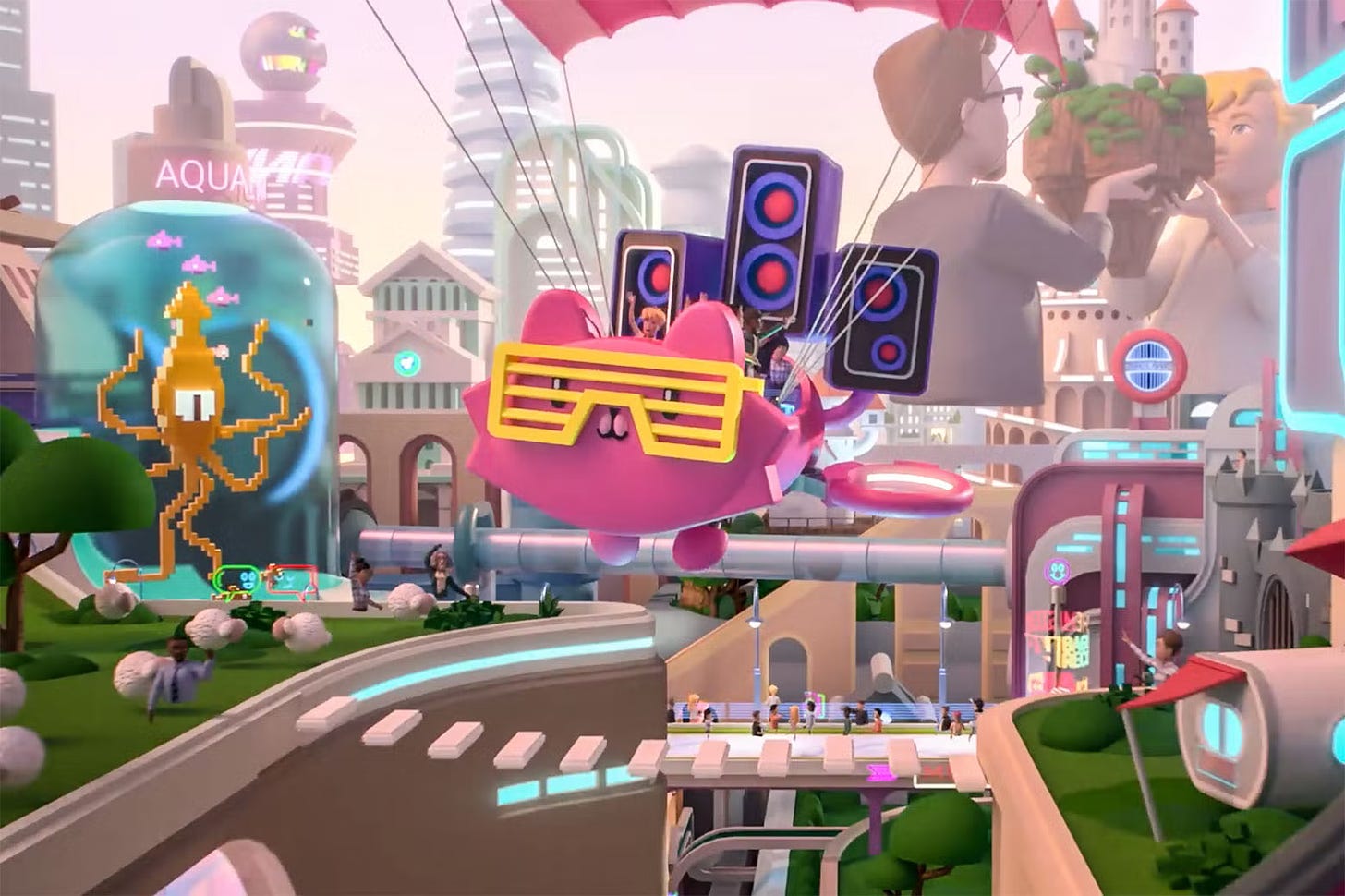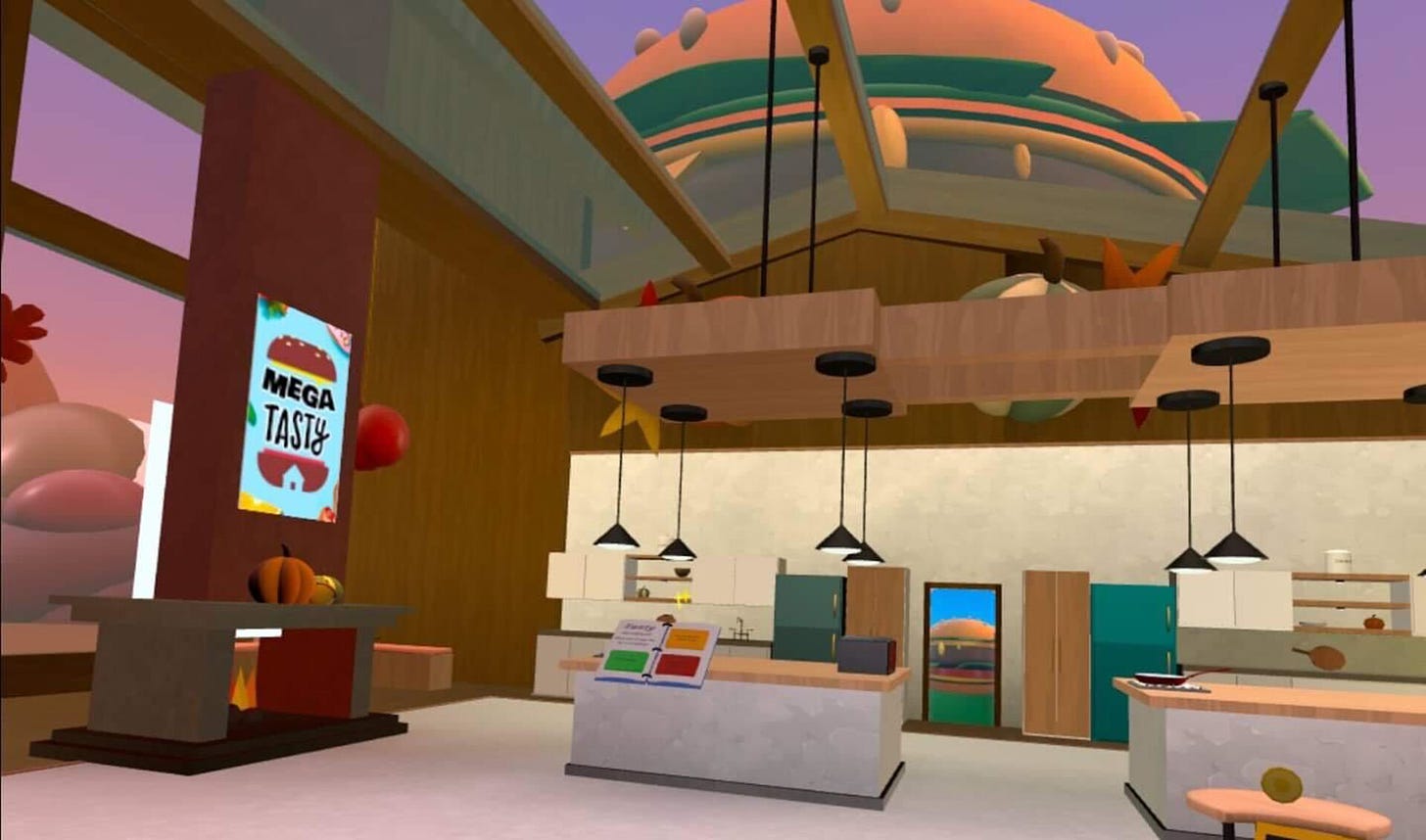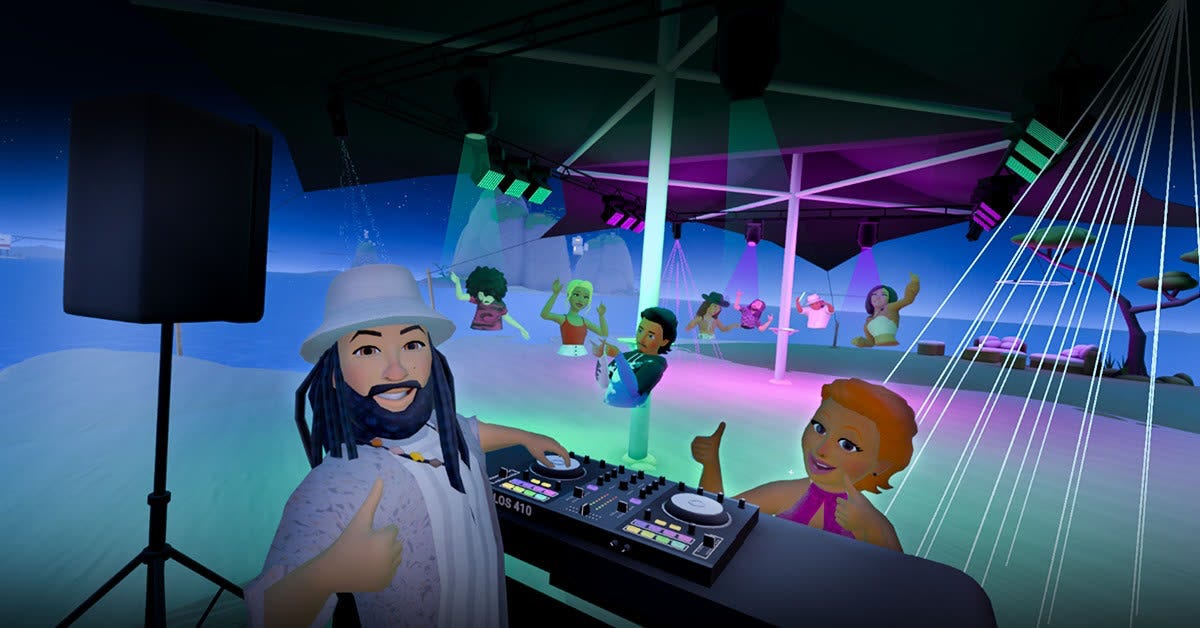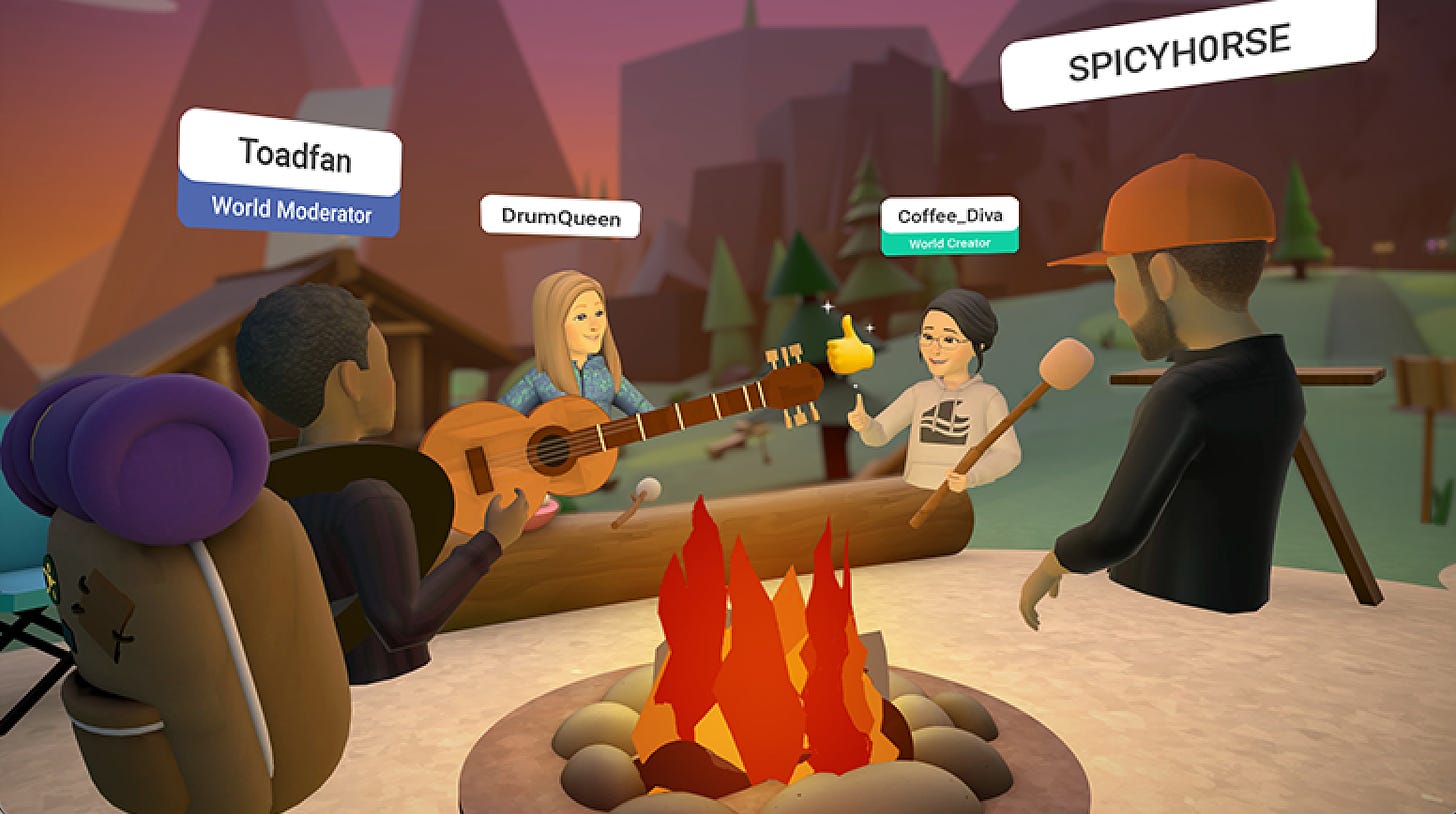Most of the recent news surrounding Meta (formerly Facebook) is negative online. The switch to shifting Meta’s primary aim from purely social media to a VR/metaverse-heavy approach, investing heavily into VR and AR, has been polarizing. When we think about an ideal metaverse, we often imagine some level of autonomy and interoperability. Currently, Meta appears to offer none of that. There’s a multitude of reasons why the Zuckerverse is mocked and criticized, and for now a good chunk of that criticism and mockery is often valid and humorous.
Plenty of articles focus too much on what things look like today, and sorely lack the understanding of both the technological, material science, and social hurdles that need to be overcome for all of this work beautifully.
It’s clear that this nascent technology is quickly converging, and full-body immersive virtual experiences will soon become a more normal, regular part of life. Most people aren’t engaging with this technology on a daily basis, but this is typical of any new, buggy technology. However, true evangelists of VR recognize that this technology is going to reshape our lives, and they’re investing more both personally and physically into the space.
I want to take some time today to focus on what we can learn from Meta’s entrance into immersive virtual spaces. Let’s outline what’s working, what clearly isn’t, and the likely trajectory of this technology as far as mass user adoption is concerned.
While I was exploring the Oreoverse for my recent article, I met Nes, an art enthusiast and builder. Nes and I really hit things off in Horizon, and agreed to sit down with me to discuss the future of Meta’s ecosystem and where he thinks VR, AR, and this technology is heading. I’ve included a supplemental video at the top of this article to give our readers a better idea of what things look like in Horizon. However, it’s important to remember that a downscaled 2D video barely does the immersiveness justice. VR is best experienced.
Let’s pause our collective dislike of Lord Zuck and dig in. We’ll start by introducing our guest, and dig into the topics of centralization, VR and the human psyche, on living a double life, new tech, and creating VR/AR experiences for clients.
This transcript ended up being quite long. I recommend listening to this conversation (I synthesized the entire article using Elevenlabs). There are also key takeaways provided at the end of the article.
Our Guest, WorldWideNes
Nes’ background in art and sculpture has given him a strong foundation for his work in augmented and virtual reality. As a project manager, he understands how to oversee the process of bringing artistic visions to life and ensuring that they are executed properly. His experience with Spark AR has given him a deep understanding of how to create compelling and engaging augmented reality experiences that can be accessed by a broad audience.
When Nes and his wife discovered Meta Horizon, they were immediately drawn to the platform's potential for artistic expression. The ability to create virtual worlds and explore the visions of other artists was a transformative experience. He sees the platform as a way to break down traditional barriers to art and bring it to a wider audience. In his view, Meta Horizon has the potential to be a truly revolutionary platform for art and creativity.
Nes has also been impressed by the community on Meta Horizon. He has met other artists and creators who are passionate about exploring the potential of the platform and pushing its boundaries. The community has been a source of inspiration and collaboration for Nes, and he believes that it is one of the key strengths of the platform.
The following is our abridged conversation. The questions are my own, and Nes’ opinions are the responses.
Aha! Moment with VR Tech
Chris: What was your aha! moment that made you realize the potential of the metaverse and immersive experiences? Did these aha moments start recently or have you had ideas about this in the past?
Nes: When I first tried virtual reality, I was blown away by the experience. Playing games like Rush and Beat Saber, visiting virtual locations like Barcelona, and watching 3D movies all felt incredibly immersive. However, it was when I discovered Meta Horizon that I truly became captivated by the potential of these technologies. Seeing the platform's ability to facilitate socializing, networking, and creative expression in immersive virtual worlds was truly amazing. The ability to visually explore art galleries and see art in a large space was an especially exciting prospect. I was also intrigued by the platform's connection to Instagram and the potential for it to surpass the success of Roblox. Seeing brands like Balenciaga already entering the space was a clear indication of the potential of Meta Horizon. I believe that this platform has immense potential for the future and I am excited to see where it goes.
As an art enthusiast, I find that the art community in Meta Horizon is fantastic for expressing myself creatively. While the platform is limited in terms of the shapes and tools available, it's actually more fun to create something unique with what's provided. It's similar to working with clay and I find it to be a rush to create something amazing with the limited shapes available. I've heard that the platform may soon allow for importing objects from other programs like Blender, which would make it even more versatile. However, this may make it harder for some artists who aren't familiar with these tools. Even so, I think that the platform is great for artists to express themselves creatively and share their unique visions with others, even if it's only with the limited shapes that are currently provided. I'm excited to see where this platform goes in the future and how it will evolve.
Control in Centralized Metaverses
Chris: In terms of Meta Horizon’s internal editor, there are fewer people who know how to use it compared to Unity and Blender. Do you think Meta will be the company to bring these experiences to life, especially with Mark Zuckerberg's vision for a more centralized metaverse? As a builder and creator, what intrigues you about Meta's approach and what do you think the future holds for Meta?
Nes: In my opinion, Meta has a great potential to take over the metaverse space. While I am not necessarily a fan of Facebook itself, I appreciate the control that Meta has over its platform. I believe that this control is necessary, similar to how we need police to ensure our safety in the physical world.
I have had some negative experiences in other virtual platforms, such as VR Chat, where I felt violated by other users. However, in Horizon World, I felt much safer as it is a more controlled space. Brands like Wendy's and Nabisco have already entered this space because they recognize the potential of Meta Horizon from a marketing perspective.
One thing that I find particularly impressive about Meta Horizon is the quality of their avatars. Even with my expensive Pro goggles, I am able to have a realistic meeting with someone and see their expressions, including blinking eyes. The avatars themselves look like they could be from a Pixar movie, but without the need for expensive production costs.
However, I do acknowledge that some people may find the control over the metaverse to be a bit violating. For example, while creating a sculpture of David, we had to cover the penis as it was deemed to be violating the platform's code. Nevertheless, I believe that this level of control is ultimately necessary to ensure a safe and positive experience for everyone, including children. Overall, I feel safe in the Meta Horizon ecosystem and think that it has a bright future ahead.
Mass Adoption
Chris: Decentralized metaverses like Decentraland, Sandbox, and others on Ethereum often feel as though they lack clear plans regarding community guidelines for safety and concern for other people's well-being. In my opinion, a DAO that has guidelines and is set up exactly like Meta, but run by a collective of people adhering to a standard, could be a potential solution.
Although I believe Meta will continue to make progress on Horizon Worlds, it is not technically defined as a metaverse yet. A metaverse should be interoperable, with interactive, open standards that a sort of open W3C-centric commission would define. Right now, it's mostly Meta's game. I wonder if there will be an inflection point in the future where mass adoption will occur, and people will fully immerse themselves in these worlds for socializing. When do you think that inflection point will be? What do you think there will be mass adoption and the potential for a killer app that will drive it forward? We talked about this before, but I'd love to hear your thoughts again.
Nes: I believe that the high cost of VR headsets is a major factor holding back mass adoption. Once the price goes down and more countries get involved, it will become more popular. I find VR to be more personal than Instagram or Facebook, and I love that you can attend concerts and events from anywhere in the world. In terms of the lack of legs in some VR experiences, I think it's more important to focus on what you see through your own eyes and not worry about what others look like. VR is the future and has many benefits, especially for seniors or those who can't be mobile. Overall, I believe that as the technology improves and becomes more accessible, VR will become even more popular.
VR & The Human Psyche
Chris: You made a good point about how VR technology can benefit people with physical disabilities or social anxiety. Have you talked to people who exclusively use VR for socializing and discussed their reasons for doing so? Do you see it as a positive thing in their lives, or do you think there could be negative consequences to relying on VR for social interaction?
Nes: It's a good question, and I think virtual reality can be both good and bad. It's great for meeting people and socializing, but it can also be depressing if you feel left out. However, Horizon is good because you have more control, and you can kick out bullies. Control is important, even though some people don't like it. As long as you're not doing anything illegal, it's a great way to socialize and build brand awareness. I think those who talk negatively about Horizon haven't experienced it fully. I love walking around and feeling comfortable in VR. It's amazing.
Chris: So, you're really hyping up this technology, but let's talk about its impact on human emotions. It allows for a deeper connection than social media because it's in real time and personalized. However, do you think it will have a long-term emotional impact on people? For example, there's a chatbot called Replika AI that was recently nerfed because people were using it for intimate experiences and it violated laws in some parts of Europe. There is understandable worry about people developing parasocial or parasitic relationships with this technology, where people seek attention and respect in a virtual space that they notably don't have in the real world. Do you see a future where people become addicted to this technology? We both enjoy it, but we still have a social life. What will it look like in 20 years?
Nes: That's a great question. I do think people will become addicted to virtual reality, especially those who struggle to socialize in real life due to fear or anxiety. This is a growing issue, as many kids and teens spend hours playing video games and lack social skills outside of gaming. However, virtual reality can also be a great way for these individuals to connect with others and feel comfortable. It's all about how you approach it. I've been in Horizon World for three months, and I've seen people form groups and argue, just like on other social media platforms. It's not unique to virtual reality. Ultimately, people will find ways to connect and disconnect with others, whether it's online or offline. So, we can't blame this addiction solely on virtual reality.
Chris: Sure, I understand what you're saying. World of Warcraft is a great example of how virtual reality can lead to real-life relationships. I haven't personally met anyone who has created a successful long-term romantic relationship through virtual reality, but I have heard of people who have. However, it's not uncommon for people to form close connections through virtual reality and carry them over to real life.
Nes: Definitely, I know people who have formed romantic relationships through virtual reality and have flown across the country to meet each other. It's like a better version of Tinder or other dating apps because you can really get to know the person and see how they act and sound. It's less scary than meeting someone on a dating app because you can become friends first and learn about each other's interests before committing to a romantic relationship. I've met a couple of couples in virtual reality myself, but I went in with my wife and a friend as a team. I think it would be a different experience if you go in by yourself because you have to start from scratch and make new connections.
Chris: Yes, that's definitely a common issue. Even if you don't have social anxiety, it can be difficult to introduce yourself to a group of people in a virtual space just like in the real world. It's easy to feel like an outsider when everyone else seems to know each other already. However, I think virtual reality can actually help with this issue because you can take your time and find a group or person that you feel comfortable approaching. It's also easier to break the ice because you can start talking about the virtual space or the shared interests that brought you there. Ultimately, it's about finding the right approach and being open to meeting new people.
Nes: Absolutely, there are some really nice people in virtual reality who are welcoming and supportive, especially to newcomers. In fact, you might meet people in virtual reality that you wouldn't meet in a real-life bar because people in bars tend to be already in cliques. I've met a lot of people who are very helpful and patient in showing me how to navigate the virtual space. I understand that it can be intimidating to approach a group of people in a virtual space, just as it can be in real life. However, it's important to remember that virtual reality allows you to take your time and find the right group or person to talk to. And if you ever feel uncomfortable, you can simply turn off your headset. Overall, while the experience of entering a new virtual space may be similar to walking into a crowded bar, the virtual world offers a unique opportunity to connect with people in a different way.
On Living a Double Life
Chris: Do you think people use virtual reality to live a double life?
Nes: Do I think people use virtual reality to pretend to be someone else? Yes, I do. It's like on Instagram where people post their best lives and others believe it. It's the same in virtual reality where someone can create a persona and people might believe it. But in the end, the truth will always come out, and it's important to be genuine and true to oneself.
Chris: Have you noticed a separation between your real-life friends and your virtual friends? Like for me, I work remotely and travel a lot with my girlfriend, so I have friends in both the ‘real world’ and online communities, especially the crypto space. Do you feel like you've also developed a similar partition between your real-life friends and virtual friends?
Nes: Yes, I have friends in both the virtual world and the real world. In the virtual world, people know me as WorldWideNes and I keep my personal life separate from it. I explain it to my real friends and they all want to try it because I explain things so clearly that they get excited about it too. I think virtual reality is amazing and it's the future. It's a great way for companies to have meetings and it saves on travel expenses. I told my friend who's the GM for the Minnesota Timberwolves about it and he was amazed by the possibilities. The NBA is already doing a lot with virtual reality, like letting people sit in the front row at games. And concerts in virtual reality are amazing. You can experience them for free and it's like the artist is singing just to you. It's the future and I think it's amazing.
Chris: So I think VR has a lot of potential for sports and entertainment. For example, in the NBA, they're already using VR to bring fans closer to the action. And I think they could sell subscriptions where fans can have a VR experience and see the game from the front row. There was a recently released VR football game where you can be the quarterback. If you take that idea a step further, you could create an NFT where one person can have the experience of being the QB for each game. It could be sold to the highest bidder or for a set price. There are a lot of possibilities with VR and I think sports and entertainment will definitely be a big part of it.
Mixed-Reality
Chris: So, you're really into VR and you see a lot of potential in these immersive social experiences, but what about AR and mixed reality? Like, what do you think about the idea of having the Oculus Pro with color passthrough so you can see things in the real world? And what about the potential for glasses like what Meta is working on, where you could have a heads-up display in your glasses, like a HUD that shows you where you're going while you're driving? Do you see potential in AR and mixed reality, and what are your thoughts on it?
Nes: So, AR is the future and it's even better than VR (at the moment). The fact that it can be used on a phone is amazing. It's all about creating content and the details that can be created on the filters is impressive. AR glasses are going to be incredible for directions and being able to see them right on your glasses. Pokémon Go was one of the best first examples. The potential for AR is incredible.
Pros and Cons of Quest Pro Ownership
Chris: Have you come across any compelling applications or experiences that would persuade someone to purchase an Oculus Pro specifically for its mixed-reality capabilities? While there are a few tech demos and experiences where you can create a rollercoaster in your house, my concern is that most developers and creators are building for the Quest 2 because that's where the majority of users are. Have you seen anything that would make you say, "Okay, any future headset needs to have mixed reality?"
Nes: I don't really use the passthrough feature on the headset much, to be honest. At the studio where I work, we have used it for some augmented reality work, which I think is pretty cool. But personally, I prefer using AR on my phone rather than the headset. I think the glasses with AR will be even better because they're not as bulky as the headset. I haven't tried the rollercoaster experience on the glasses yet, but it sounds amazing. I think the Pro headset is great for face recognition and tracking your facial expressions, which is perfect for meetings. If I were a company owner, I would definitely choose the Pro over the Quest because I want to be able to see my clients' reactions. In fact, when we try out the Horizon later, I'll be able to show you all my facial expressions, which is pretty cool. My wife even does Instagram videos with the Pro headset, and people are amazed at how real it looks. It's like a Pixar movie, but without the expensive production costs.
I had the Quest 2 before and I was jealous when my wife got the Pro headset because of the facial recognition. I could see every movement of her face and it was a game-changer for me. So, I returned my Quest 2 and bought the Pro, and I'm so glad I did. It's a bit pricey, but the experience is worth it. I love being able to walk around my house and still see everything through my goggles, and the open design is perfect for me. The Pro is definitely the way to go, and I can't wait to see what other headsets come out in the future.
In my opinion, there's not a huge difference between the graphics of the Quest and the Pro. The Pro has slightly better textures, but it's not a significant improvement. However, the Pro is more comfortable, lighter, and easier to move around in. It doesn't get as hot on your face and the facial recognition and eye tracking are on another level. So, overall, the Pro is definitely worth the investment.
For me, it's important to be able to see and move around freely, so I prefer the Oculus Pro. I like to stand up and walk around while using it, instead of just sitting down. With the Pro, I don't have to worry about crashing into walls like I did with the Quest.
Creating Experiences for Clients
Chris: So let me ask you about typical processes you have with clients. What does the typical process with a client entail?
Nes: I haven't worked with clients in Horizon World yet, but I have experience working with clients in AR and augmented reality. We create a whole sculpture or model of what would be good for them to see in AR. It's important to create a three-dimensional product that people can see all the way around, not just a flat image that looks like a sticker. We create good-looking filters to make the product feel more tangible. Our AR skills are on another level, and we want people to feel like the product is really there, like they can touch it.
Chris: That’s awesome. Tell me about some of your team’s proudest creations, and where people can find your work to take a look.
Nes: In Horizon World, we have created a few worlds such as Pizza Lovers, Biggie World, and the incredible recreation of Michaelangelo’s David sculpture. These are the worlds that we have created so far, and we are currently working on more. You can search for Pizza Lovers within Horizon to experience our world. You can also find more information on our Instagram pages, Real Life Effects and WorldWideNes.
Key Takeaways
Horizon’s ability to facilitate socializing, networking, and creative expression is powerful and is leaving a lasting impact on people.
Having moderation and control within virtual experiences is extremely important for creating a safe and positive experience for everyone.
The high cost of VR ownership is a major factor holding back mass adoption
Just like in real life, if you’re left out in VR it can feel like being left out in a real life social situation.
Horizon is a great way to build brand awareness and spaces are being set up to facilitate this.
People are going to become addicted to this technology, especially those that struggle in life with social anxiety and depression.
We cannot blame technology. We have to take personal accountability for usage.
People are already using this technology to form romantic relationships, and they are using it like a first date (or multiple).
You can be just as uncomfortable walking into an unfamiliar social environment in VR as you might in the real world (like in a crowded bar where you don’t know anyone).
Many people are opting to keep their personal lives out of their parallel virtual ones.
AR is here now. VR is coming soon.
Quest Pro is worth the cost if you value comfort, ease of use, and portability. It won’t match the resolution or ‘wow’ factor of recently released headsets like PSVR2.
There is less work right now for creators wanting to build metaverse-like experiences, and more brands are able to capitalize on the potential usage of AR.
It was a pleasure talking to Nes, and especially getting his perspective on everything that is going on with Meta’s ecosystem. He was a great host and teacher, and showed me around a number of custom built worlds that I otherwise wouldn’t have known about. I’ve spent some time in VRChat in the past, but it was nice to check out another ecosystem and see what was going on.
To wrap things up, I still think Meta has a long way to go. The headsets are technologically incredible, but we’re still a few years away from these devices being immersive enough to warrant mass adoption. It will happen, just not this year! That’s fine. Remember, video games were popular for over a decade before Nintendo’s NES hit store shelves; we’re closer than ever before to VR’s first true game changing experience. I highly recommend people try out this technology, and I’ve found it personally very useful for socializing with friends and family (we love playing golf).
Thanks for reading,
Chris
References:
https://www.washingtonpost.com/technology/2023/03/08/metaverse-horizon-worlds-kids-harassment/
https://technical.ly/software-development/horizon-worlds-vr-metaverse-entrepreneurs/#:~:text=Building%20Horizon&text=Briley%20and%20Torres%20live%20in,features%20that%20were%20very%20basic
https://izea.com/resources/horizon-worlds-influencers/












Meta’s ‘Metaverse’: Mass Adoption, The Human Psyche, and Parallel Lives